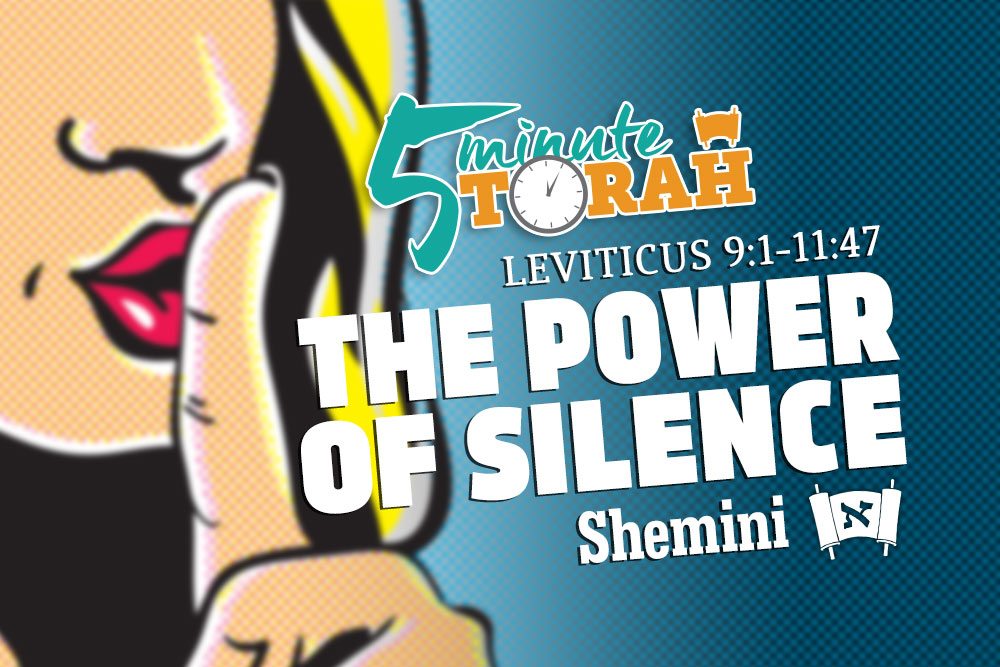The Power Of Silence
Series:

This week’s Torah reading is not only the source for the Torah’s dietary laws, but it also records the very first service of the Mishkan, the Tabernacle. It was a time unprecedented in human history when the very presence of the LORD rested upon a physical structure created by the labor of man. But unfortunately, there was a horrible tragedy that took place immediately after this event. Two of Aaron’s sons, Nadab and Abihu, enjoyed the presence of the LORD so much that they wanted to recreate it. They entered the the sanctuary with incense and “unauthorized fire” in order to experience this exhilarating event a second time. Rather than being enrapturing, however, the results were disastrous:
Now Nadab and Abihu, the sons of Aaron, each took his censer and put fire in it and laid incense on it and offered unauthorized fire before the LORD, which he had not commanded them. And fire came out from before the LORD and consumed them, and they died before the LORD. Then Moses said to Aaron, “This is what the LORD has said: ‘Among those who are near me I will be sanctified, and before all the people I will be glorified.’” And Aaron held his peace. (Leviticus 10:1–3)
Because of this incident Aaron lost two of his four sons. Many people read through this account without any empathy for this great man who was bereaved of two of his children. However, without empathy we cannot realize the incredible strength and maturity of Aaron in this situation. Several translations say that Aaron “held his peace.” This conveys the basic concept, but the Hebrew is much more straightforward. It says that he was silent (vayidom). For a man who just experienced such a devastation as Aaron, this shows an incredible amount of self-restraint.
Why is holding one’s tongue so difficult? What is so wrong with speaking one’s mind? According to a Jewish perspective, all human activity is express is one of three modes: thought, speech, and deed. These are called the garments of the soul, because we can choose which types of thoughts, words, and deeds we “put on” each day to set the course of our day. Many people have the self-restraint to control their deeds. Few people are able to restrain and focus their thoughts. Of these three, speech seems to be the main battleground for most people. Sometimes we put on the right garment, but sometimes we don’t.
We must keep in mind that words are powerful. Words create. Words manipulate. Words connect. Words convey ideas and ideals. Words bring life and bring death (Proverbs 18:21). Words can take a person from one world to another by way of storytelling. The “fruit of our lips” are an offering of worship (Hebrews 13:15; Hosea 14:2). This is why we must realize the power of our words and exercise restraint in our use of them. Yeshua taught us that we will be held accountable to everything we speak:
I tell you, on the day of judgment people will give account for every careless word they speak, for by your words you will be justified, and by your words you will be condemned. (Matthew 12:36–37)
Too often the words are leaving our mouth before we ever realize it has opened. We must somehow find ways to heighten our awareness that this is happening so that we can gain control of our tongues. Aaron was aware of this tendency and knew that to speak in his current state would be an error that might come back to haunt him later.
Rebbe Nachman of Breslov, the founder of the Breslov Chassidic movement, commented on Aaron’s restraint with profound insight. He said that as a child one learns to speak, but only in maturity does one learn to be silent, and that the problem of man is that he learns to speak before he learns to be silent. Aaron had every right to throw a fit at the death of his sons. But he held his tongue. His maturity and spiritual awareness overcame his natural inclination to voice his emotional response.
Because Aaron was silent in a moment that could have easily gotten the best of him, the LORD was able open his mouth to speak a powerful word of correction to his brother, Moses, just a short time later in a manner he could receive:
And Aaron said to Moses, “Behold, today they have offered their sin offering and their burnt offering before the LORD, and yet such things as these have happened to me! If I had eaten the sin offering today, would the LORD have approved?” And when Moses heard that, he approved. (Leviticus 10:19–20)
This is the first and only time we hear of Aaron correcting Moses. Since Aaron had chosen silence as his response when fire from the LORD had consumed his sons, he was given the words to speak to Moses that would set the pattern for how any type of offering was to be consumed going forward. They should not be eaten in a state of mourning, as we proclaim when bringing our tithe to the Holy Temple, “I have not eaten of the tithe while I was mourning” (Deuteronomy 26:14).
Although words are powerful, sometimes silence can be just as powerful, just as effective, and even considered an offering of praise (see Psalm 65:2[1]). The next time you are at a point of outrage, remember the example of Aaron who knew the power of silence and the damage of unrestrained speech.








